I tried to explore as much of Jeju as I could on my first trip there, in Aewol and Seogwipo but it really was impossible to cover everything! My east side adventures mostly consisted of climbing Seongsan Ilchulbong and checking out Seopjikoji which I’ll detail in this post – I also spend 2 nights on Udo Island so check out that separate post if you plan to visit.
Seongsan Ilchulbong
성산 일출봉
Aside from the iconic Hallasan in the centre of Jeju, one of its more famous volcanic peaks or oreum is the Sunrise Peak or Seongsan Ilchulbong. Located on the eastern tip of Jeju, this picturesque tuff cone is where Koreans head to at dawn to catch the perfect sunrise, an especially popular activity over the New Year.
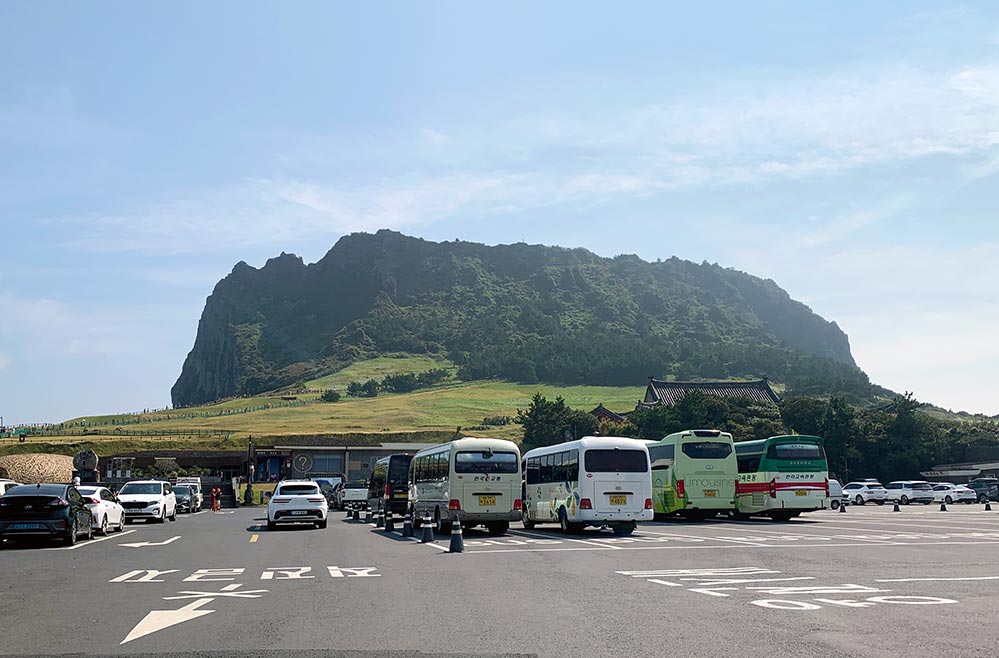
Climbing to the peak
Seongsan Ilchulbong isn’t particularly tall for a mountain in South Korea. Rising 180m above, it’s just a tad taller than Singapore’s own highest peak Bukit Timah Hill (165m), but this oreum was created over 5,000 years ago and has a huge crater at its peak.
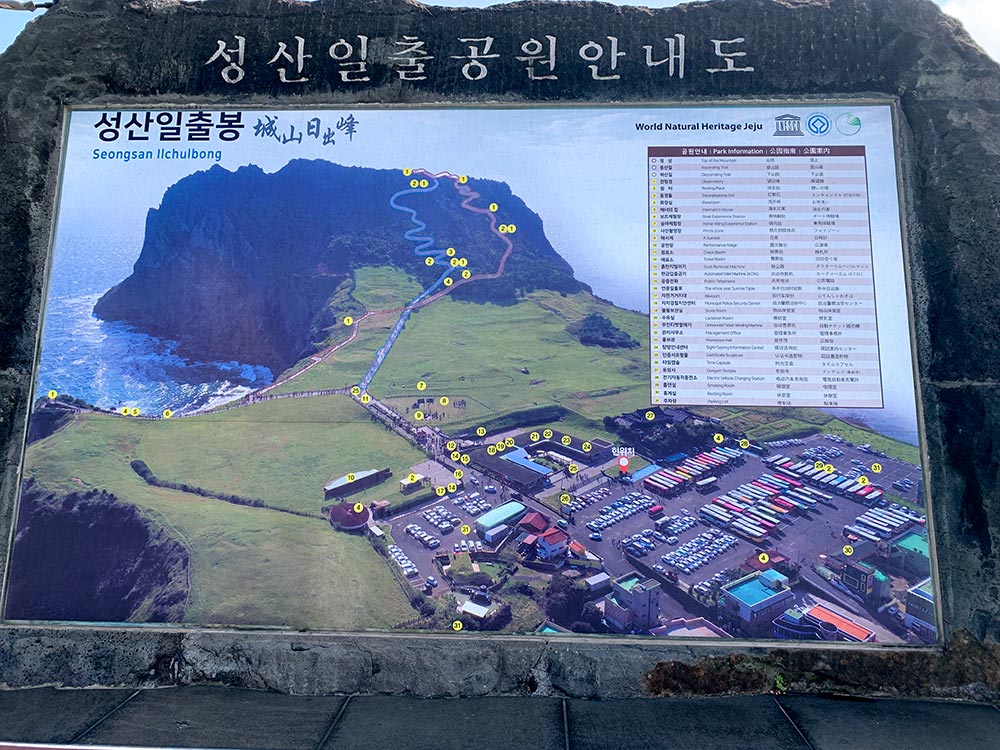
Climbing to the peak of Seongsan Ilchulbong requires you to buy a ticket. I actually managed to visit it on the one designated closed day of the month (GAH) so I came back the following day to make the climb. On the plus side, it was cloudy and cooler on the 2nd day, but my photos definitely weren’t as picturesque as when the sun was out.
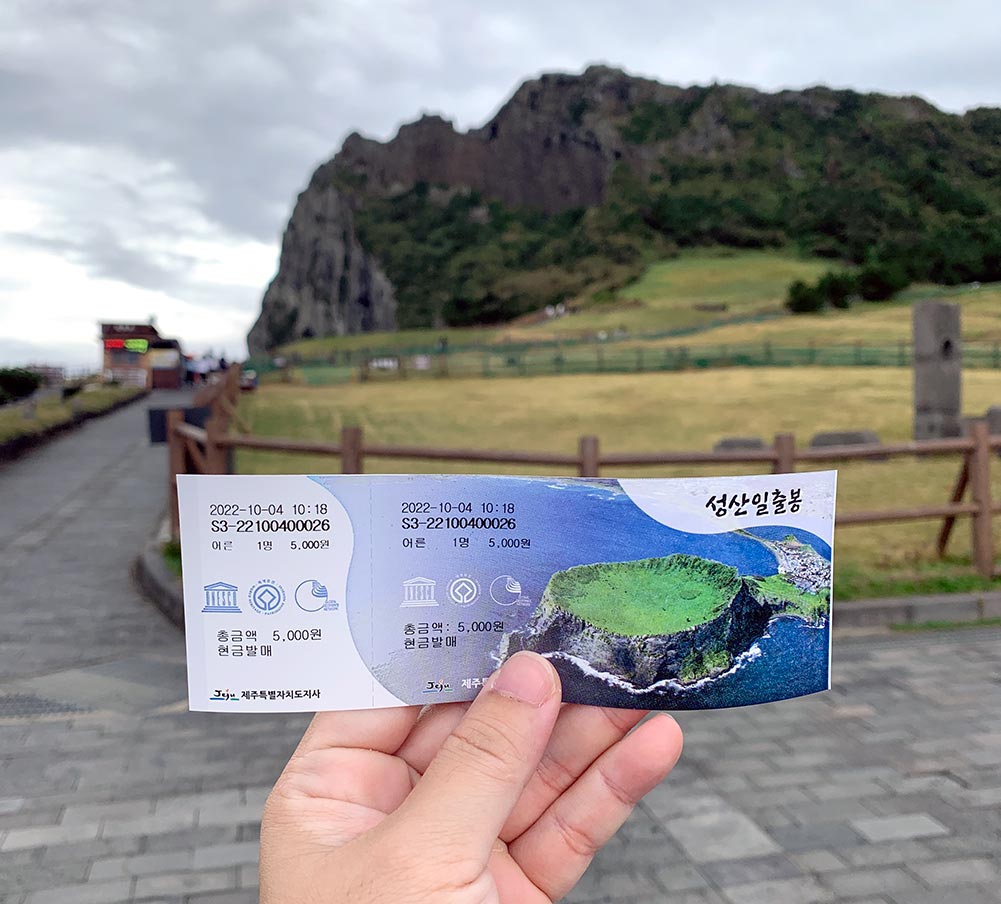
There are 2 paths that lead up to the peak, most people climb up one way and down the other. Both routes involve lots of stair climbing, but the paths are generally well maintained. It took me about 25 minutes to make the climb up, so plan for about an hour to complete the full hike – which is to climb up, hang around and snap some shots at the peak, and come back down.
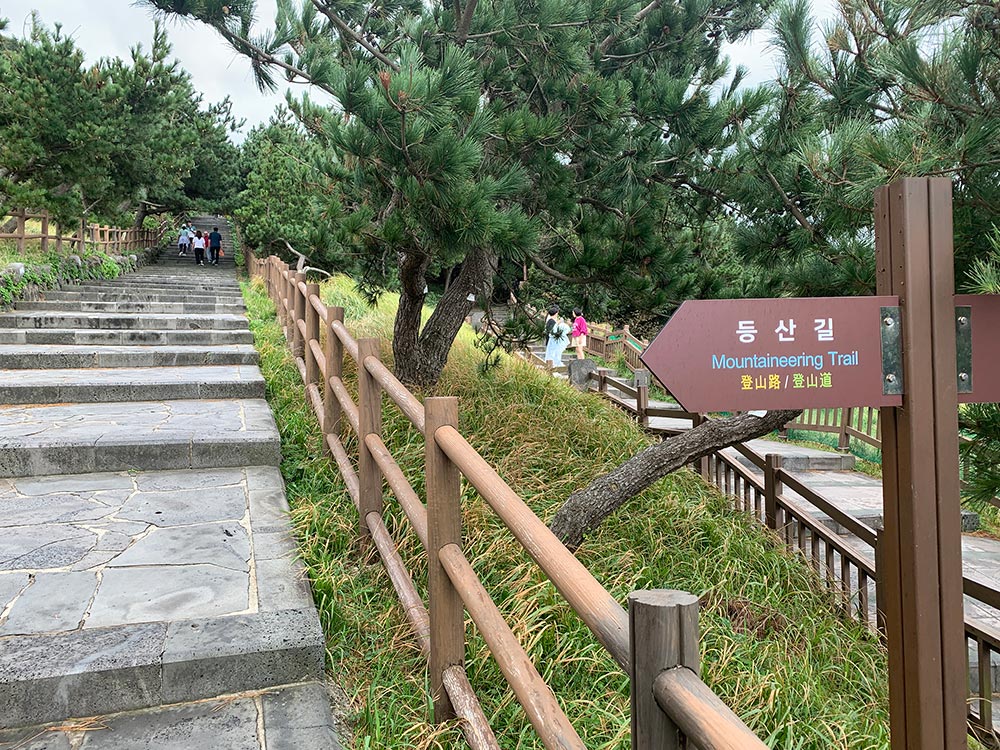
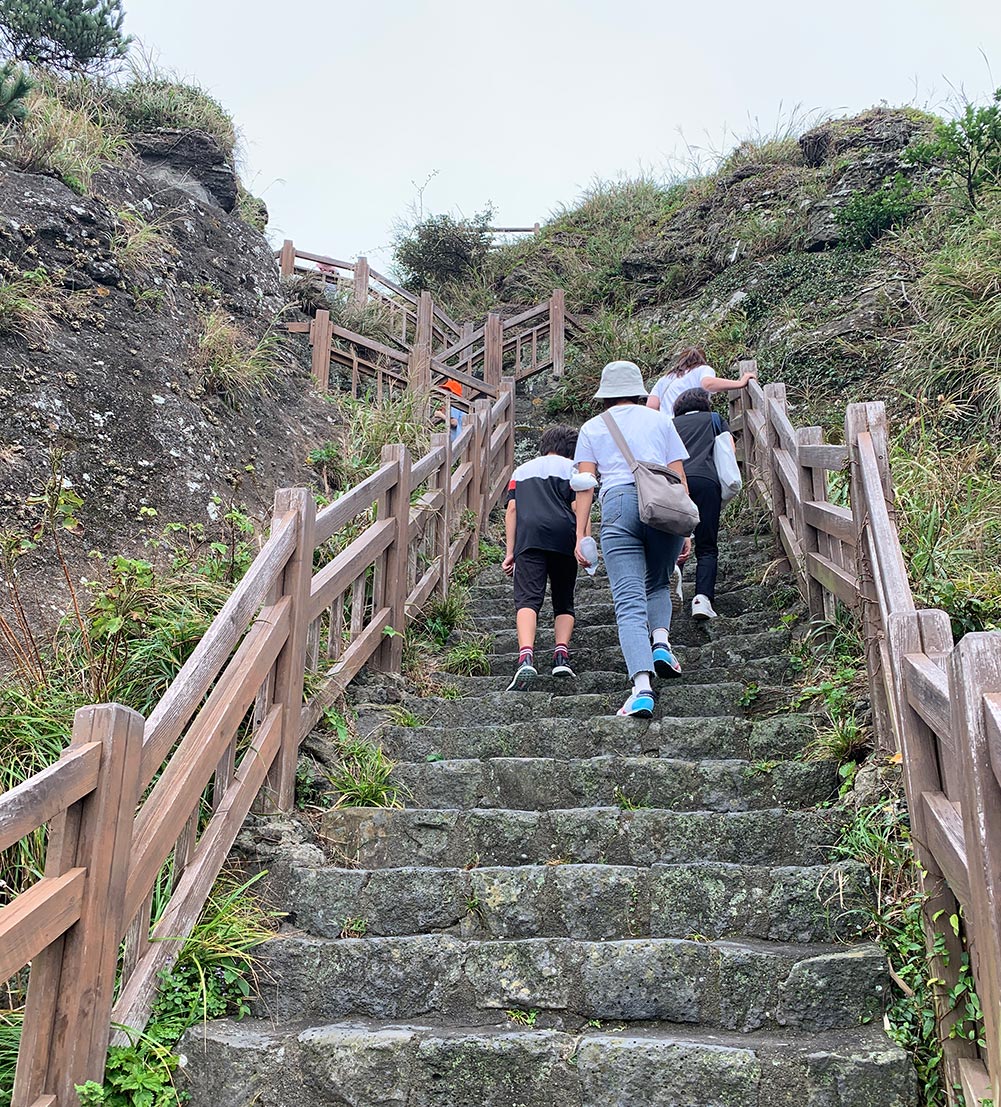
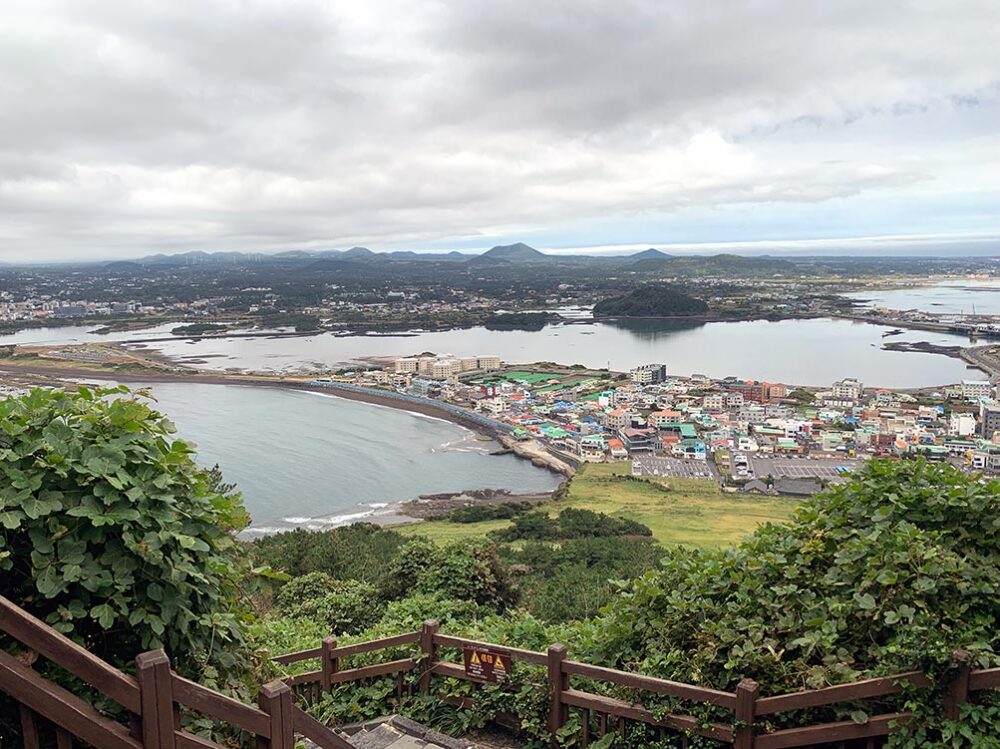
The peak area has a nice long wooden boardwalk of sorts where you can sit around and admire the view of the green crater and sea from. It can get crowded, but the crowds come and go in waves so you can enjoy short moments of serenity in between the crowds.
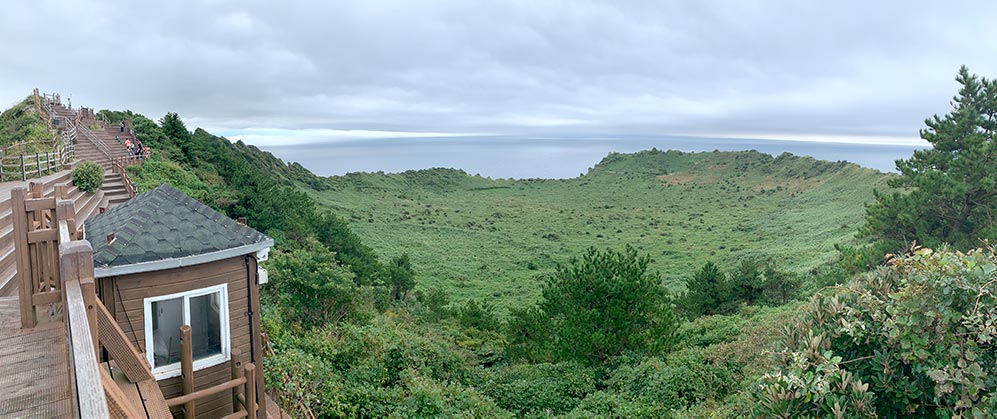
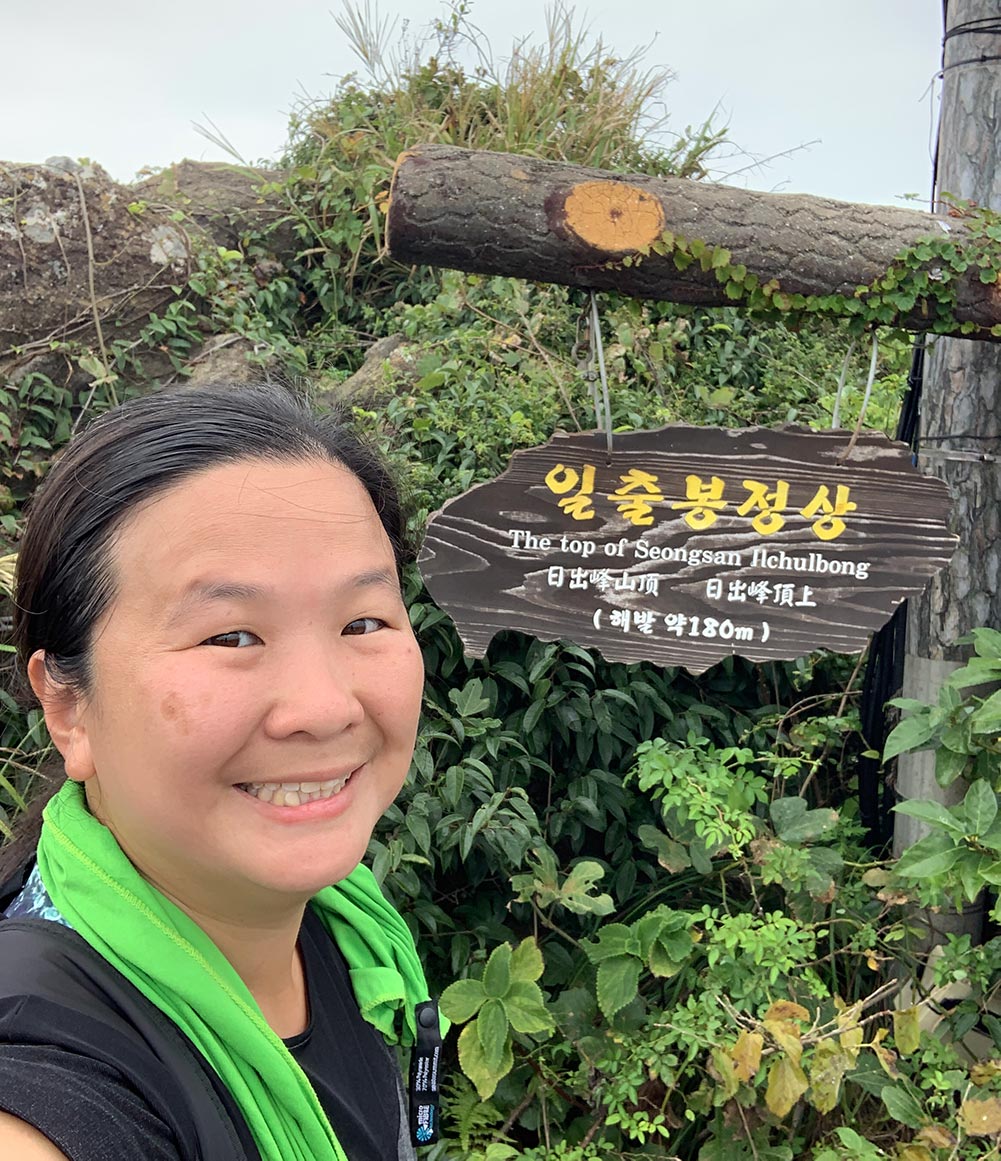
Opening hours: 7am – 8pm daily (730am – 73ppm in winter), closed on first Monday of the month.
Since the peak was closed on the first day that I visited, I took the stairs down to the black sand beach at the base of Seongsan Ilchulbong. There was a lot of activity here – queues for boat rides, daily Haenyeo performances as well as a little Haenyeo House where you can eat some of the freshly caught seafood.
Haenyeo performance
Haenyeo 해녀 are the famous Jeju women divers who are incredible free divers who dive without any air tanks and are considered a cultural treasure of Jeju. Before they dive, there are some prayers and rituals that they do which they perform here for tourists to learn more about their culture.
The Haenyeo perform shows at 130pm and 3pm on most days. When I visited, the show consisted of the Haenyeo dancing and singing to a traditional folk song. They didn’t look like they were diving anymore that day though.
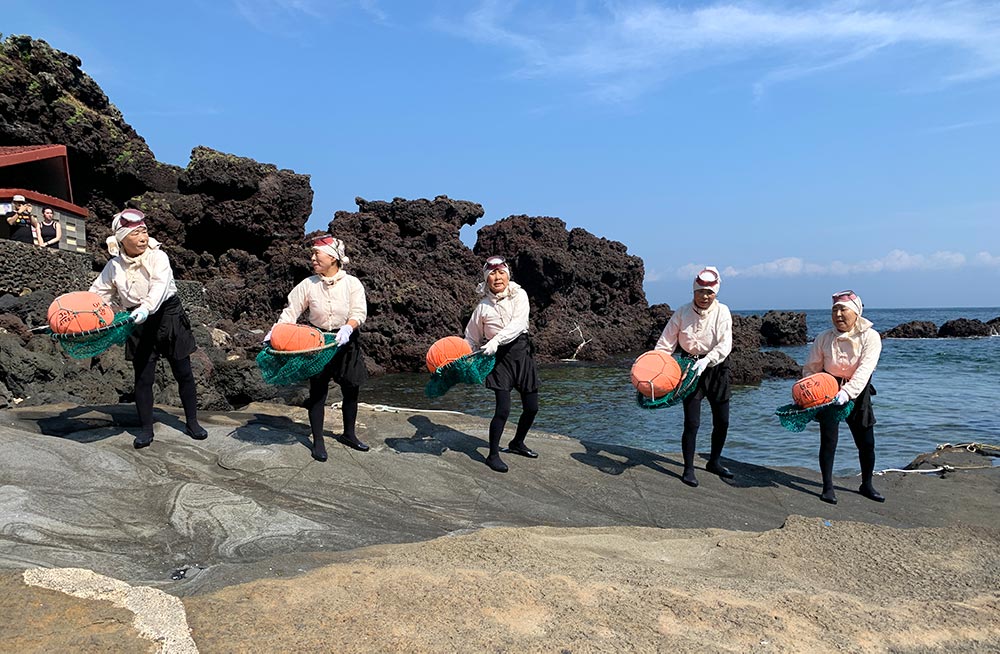
Haeyneo performance typically takes place at 1pm and 330pm
Eating freshly caught seafood at the Haenyeo House
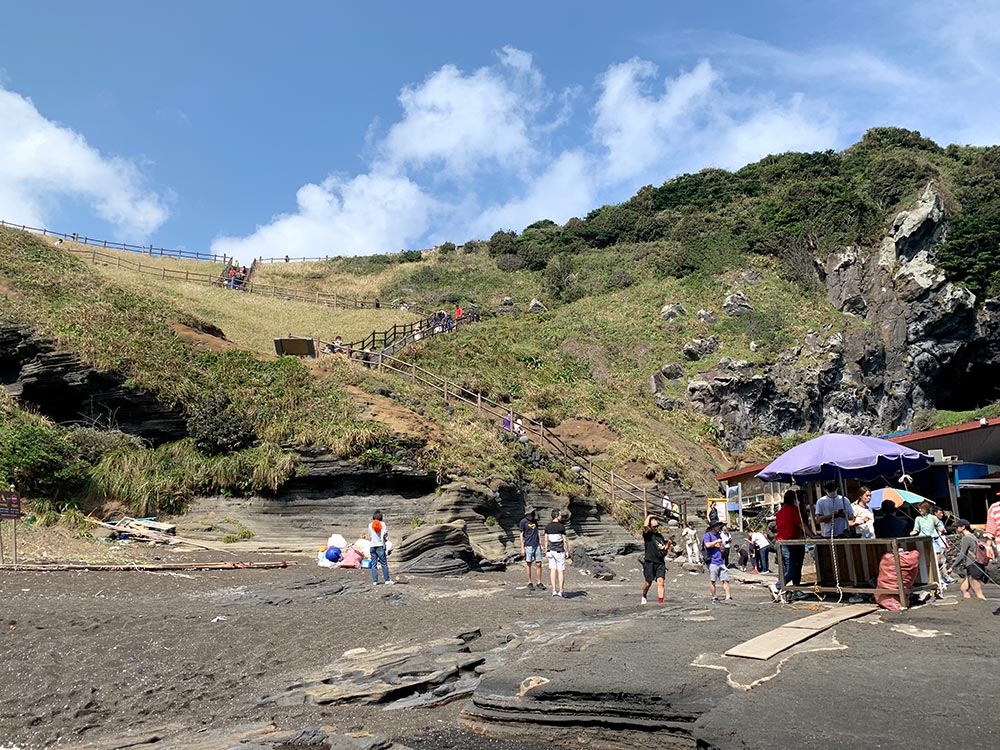
The Haenyeo sell the shellfish that they harvest in the morning at a little restaurant on the black sand beach. This restaurant is cash only, and the platter I picked cost 30,000 KRW. The ladies prepare the seafood right there and then for you, and it’s still a tad wiggly even when it’s served up to you on a tray…
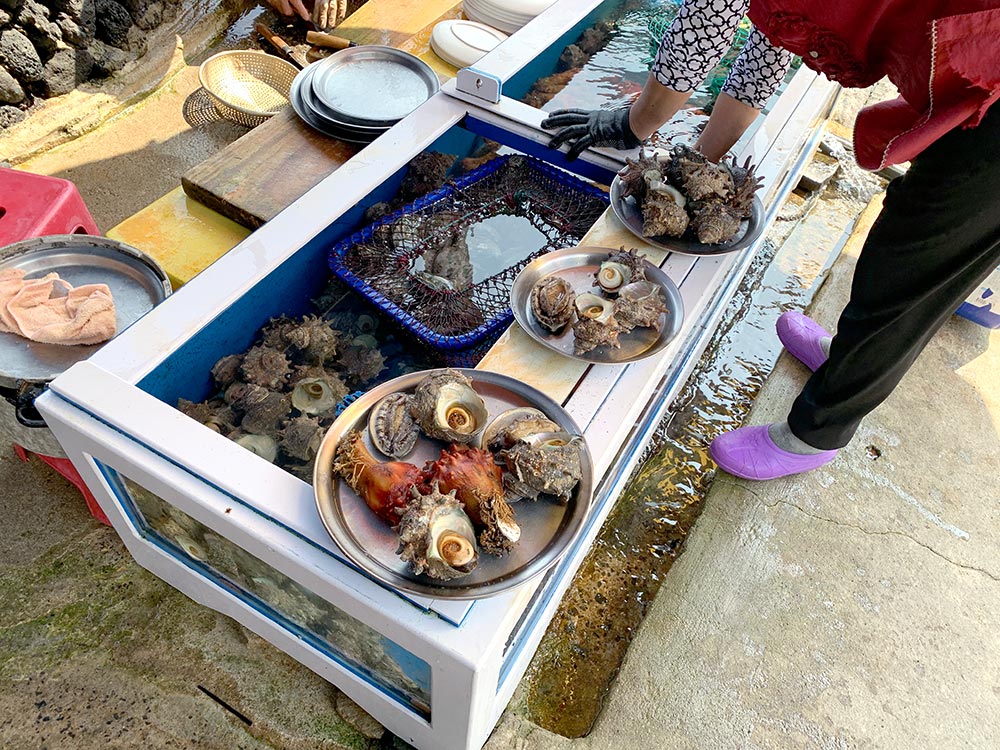
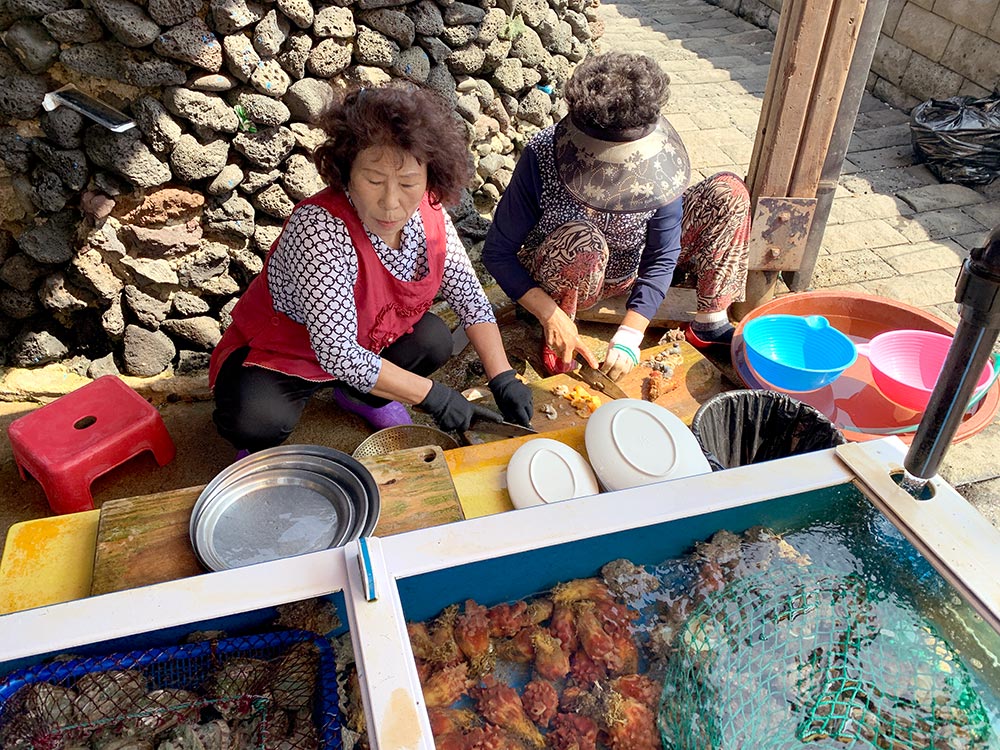
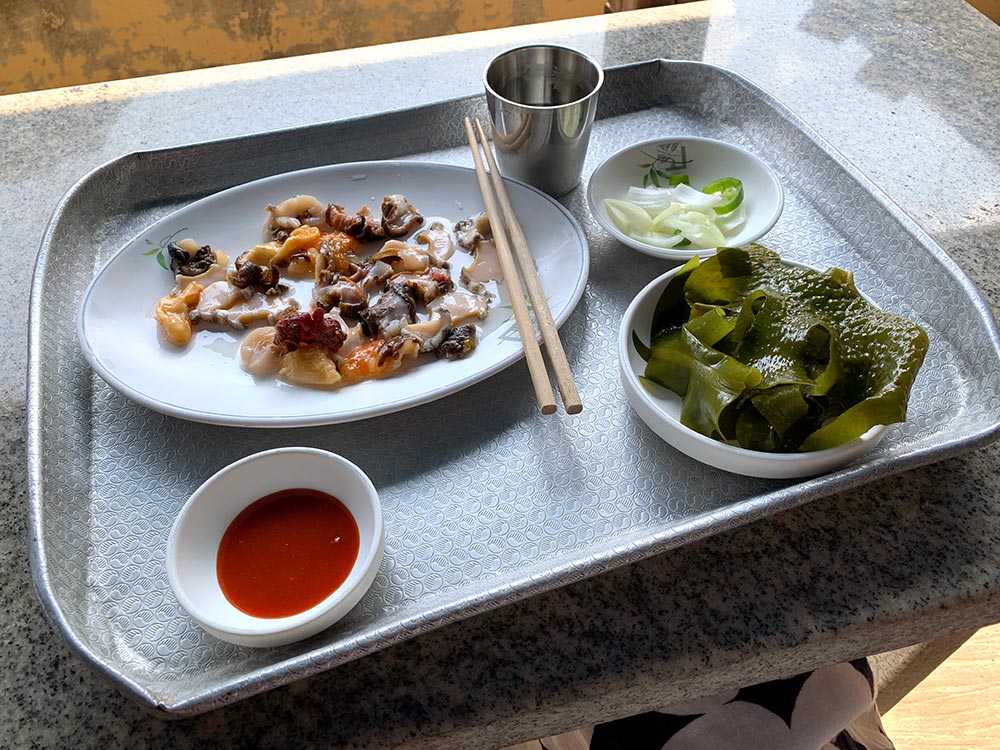
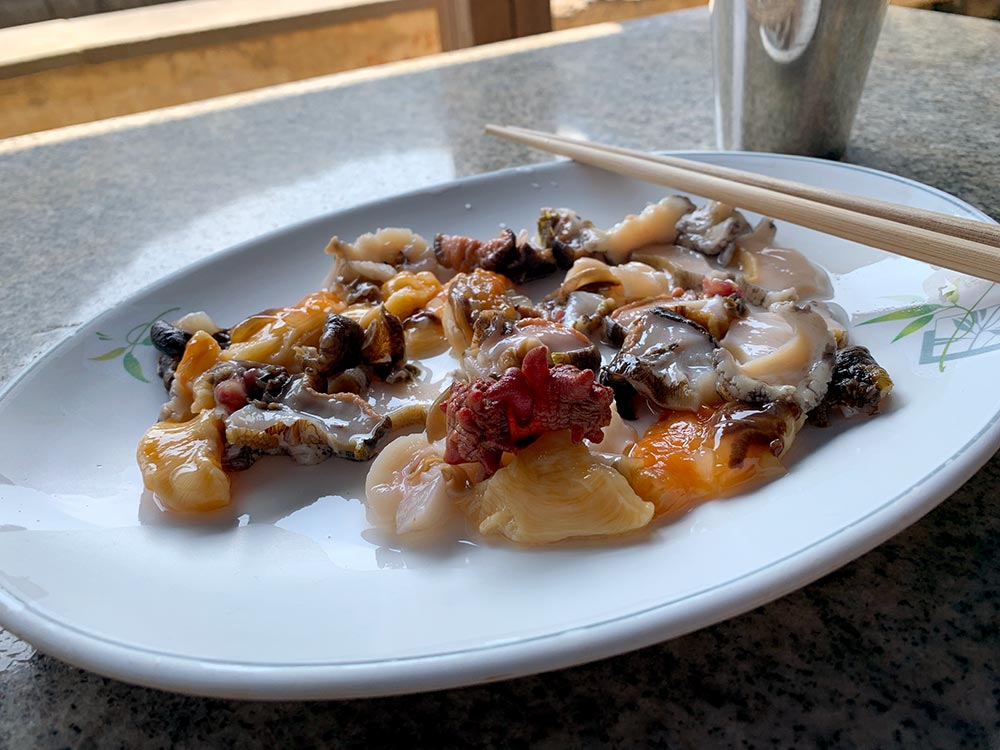
Boat ride around the tuff cone
If you want a different view of the Seongsan Ilchulbong, you can take a boat that brings you around the tuff cone on the water.
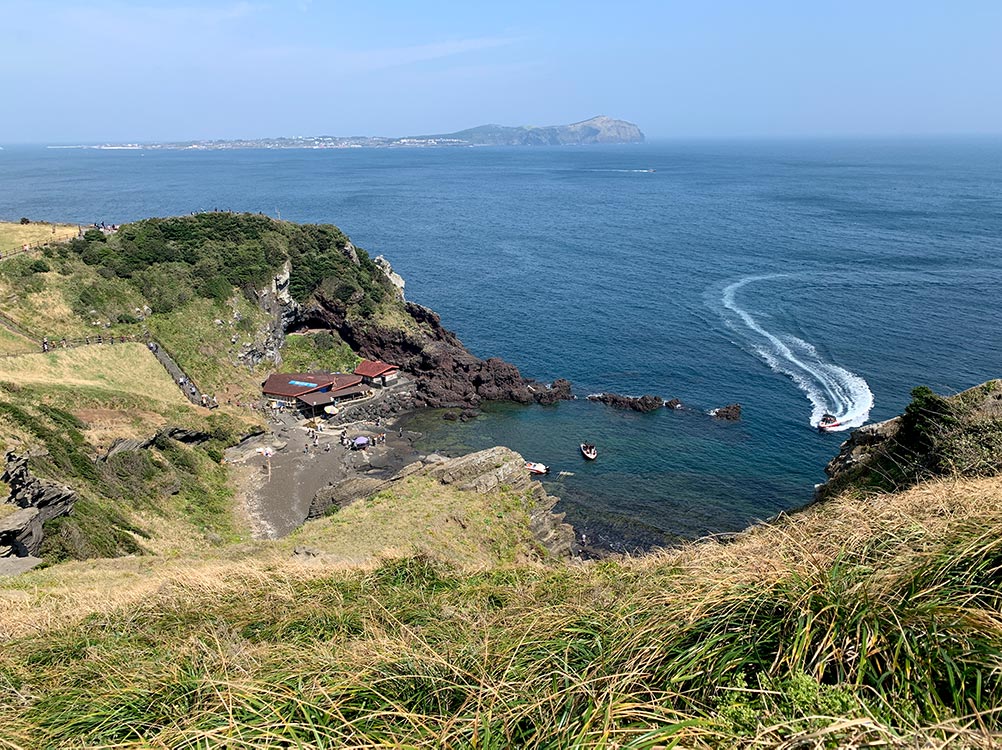
I didn’t take this boat as I did end up seeing it from the water when I headed to Udo Island, but there are 2 courses you can take: Course A takes you about halfway around and back for 10,000 KRW while Course B takes you all the way around to the other side of Sengsan Ilchulbong and back again for 20,000 KRW.
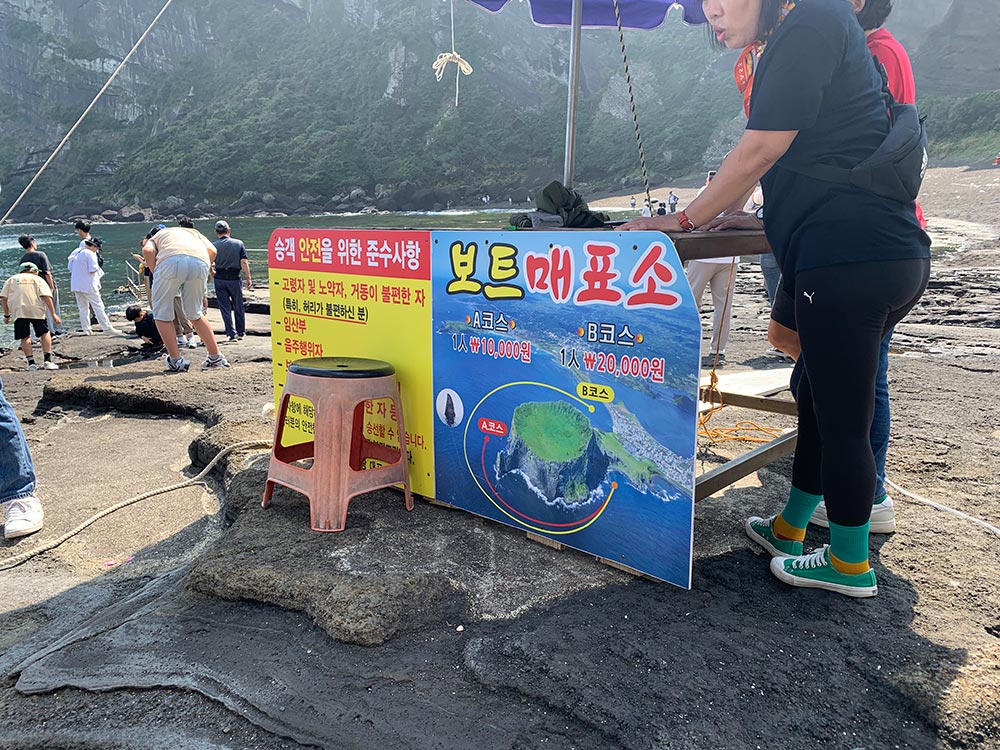
How to get to Seongsan Ilchulbong
From Seogwipo City, I had to take a bus out to the main highway area to catch Blue Bus 201 that serves the east side of Jeju and stopped at the Seongsan Ilchubong Entrance stop [naver maps]. It was a pretty long bus ride up the southeast coast of Jeju that took close to an hour!
I took a taxi the following day when I went from my Seogwipo guesthouse (Gudeok Guesthouse) directly to Seongsan Port (I was headed to Udo island) because I had luggage. That cost me about 46,000 KRW.
If you’re coming from Jeju City in the north, Bus 211 takes you from the main bus station to Seongsan Ilchulbong [naver maps]
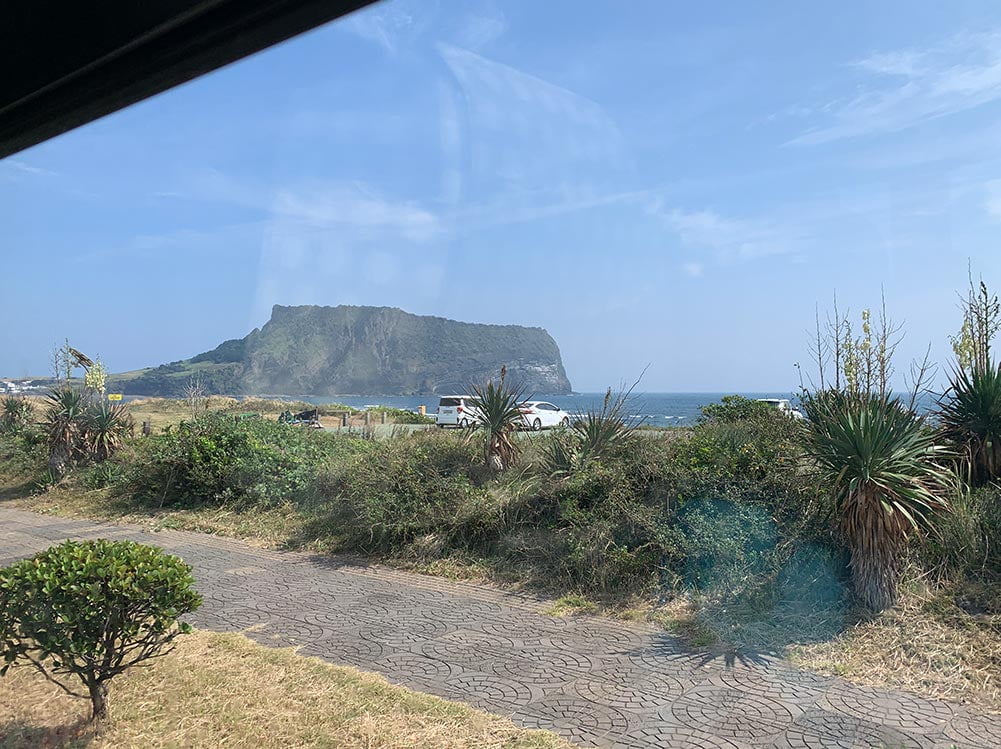
Seopjikoji
섭지코지
Since I was thwarted on my fine weather day from climbing up Seongsan Ilchulbong, I decided to explore another scenic spot around the east coast of Jeju called Seopjikoji 섭지코지 which is on the other side of the beach from Seongsan Ilchulbong.
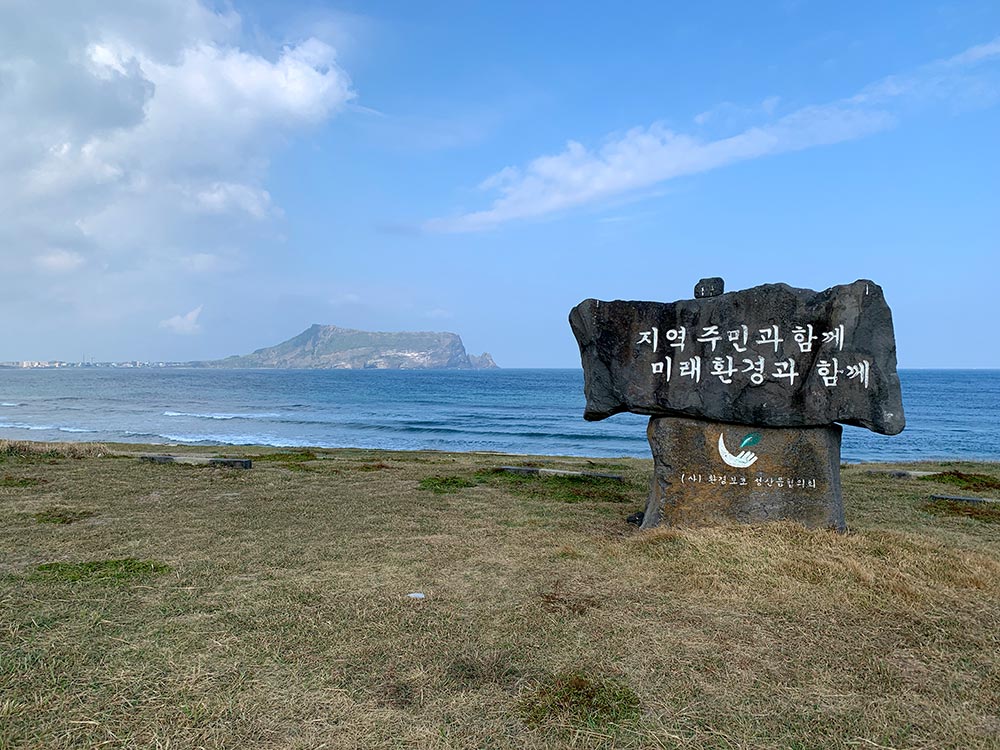
This peninsula is also where the Jeju Aqua Planet 아쿠아플라넷 제주 is located, but I didn’t visit that, instead I decided to take an anticlockwise walk around this little cape.
Kitesurfing and windsurfing at Shinyang Seopji Beach
The first beach I passed was Shinyang Seopji Beach 신양섭지해수욕장 and it was a windy day and there were tons of kitesurfers out on the water. I stayed and watched them float and fly around for a bit.
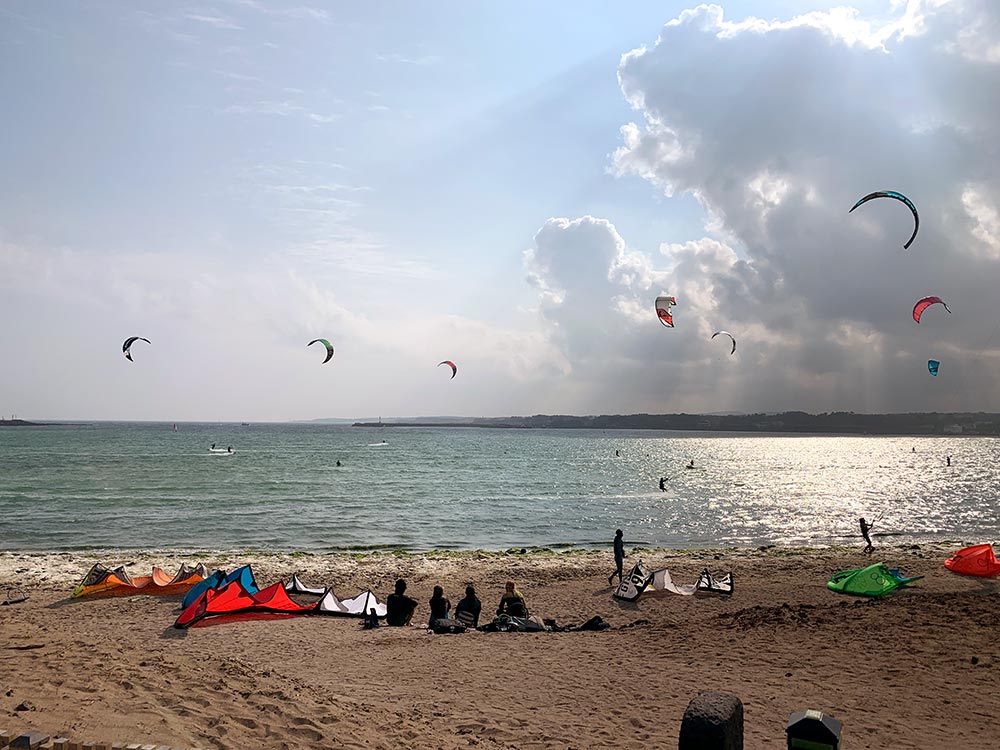
Further down the beach were the windsurfers, also plenty of them were out on the water. There were lots of benches along the waterfront so I sat down here to watch them go at it.
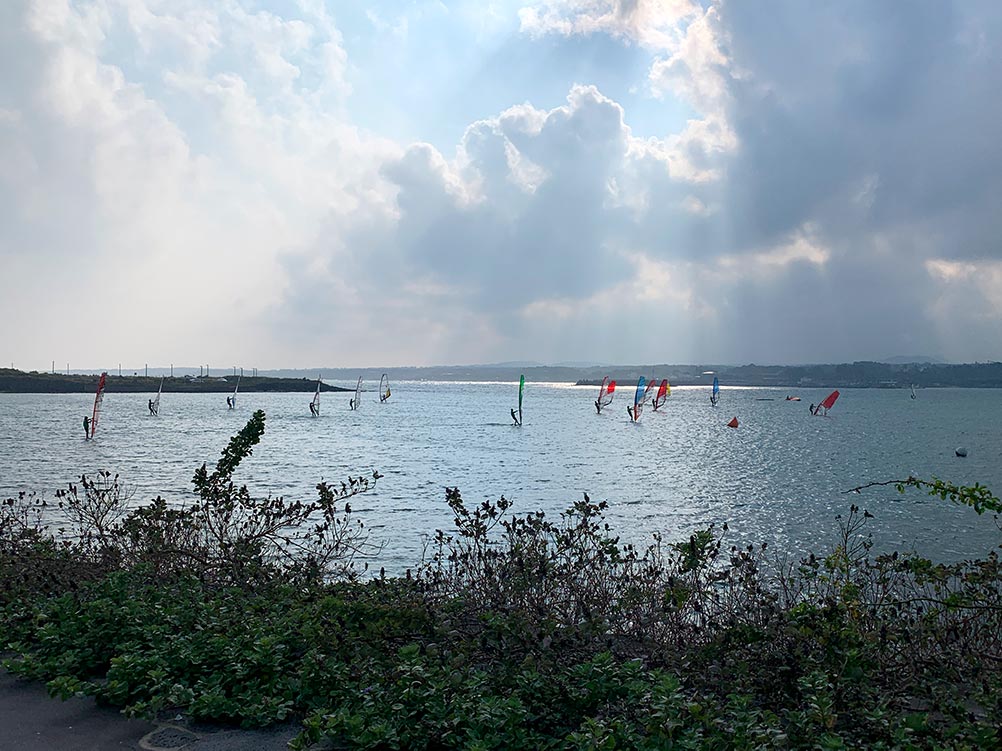
There are some resorts in the inland area. I followed the coast and the vehicle road that ends at the tip of the cape (about halfway around the cape) where there is a carpark. From there, the boardwalk starts as I headed back up northwards.
See the remains of Haenyeo Shelters
Along the way I passed by the remains of a stone structure along the seaside with a sign. Called Keunyeo Bultok 큰여불턱, this is actually an example of one of the stone structures by the sea that the haenyeo women divers would used to rest, change and relax in between dives. It doesn’t have a roof so I guess it’s mostly just to block the wind?
According to the sign, this is one of the larger shelters that they used in the Seopjikoji area.
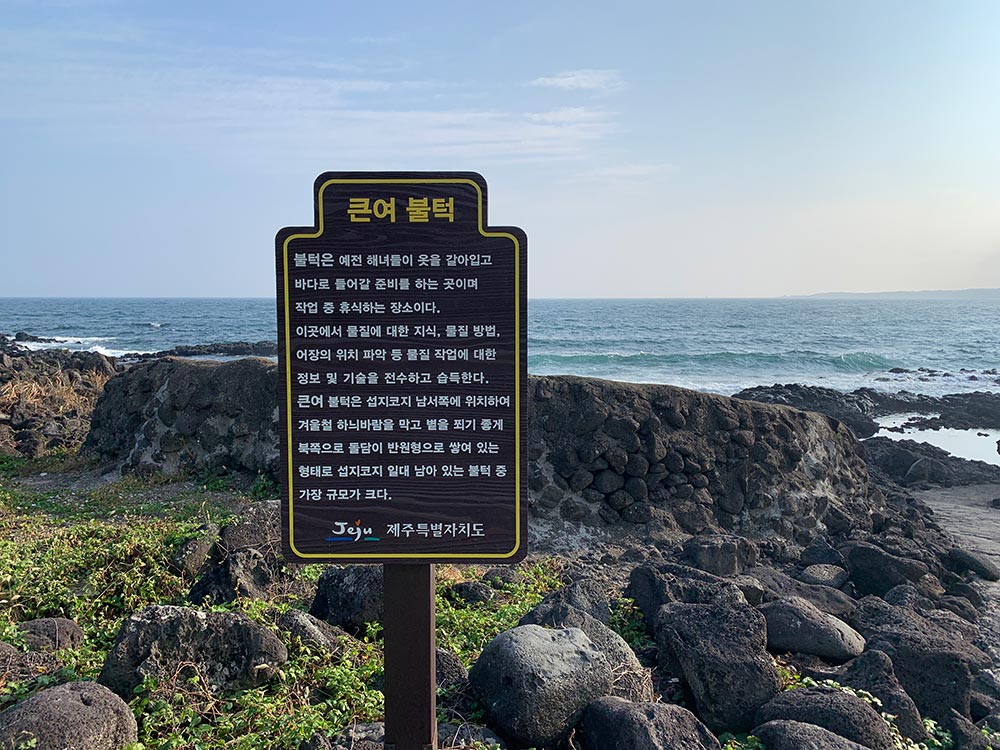
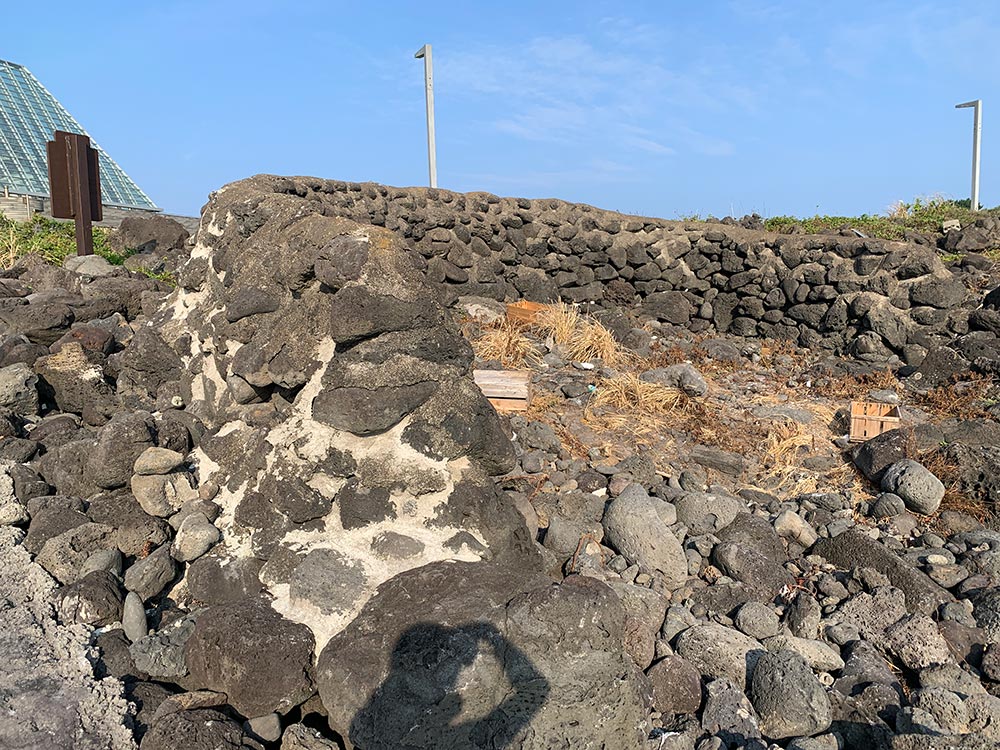
Stroll along Seopjikoji boardwalk
Seopjikoji was pretty when I visited in October, but it’s supposed to be at its peak in April when fields of yellow canola flowers cover the small oreum here known as Bulgeun Oreum 붉은오름 where a fire beacon station was once located.
There are a couple of viewpoints along the path, a little stair climbing is involved but nothing too crazy.
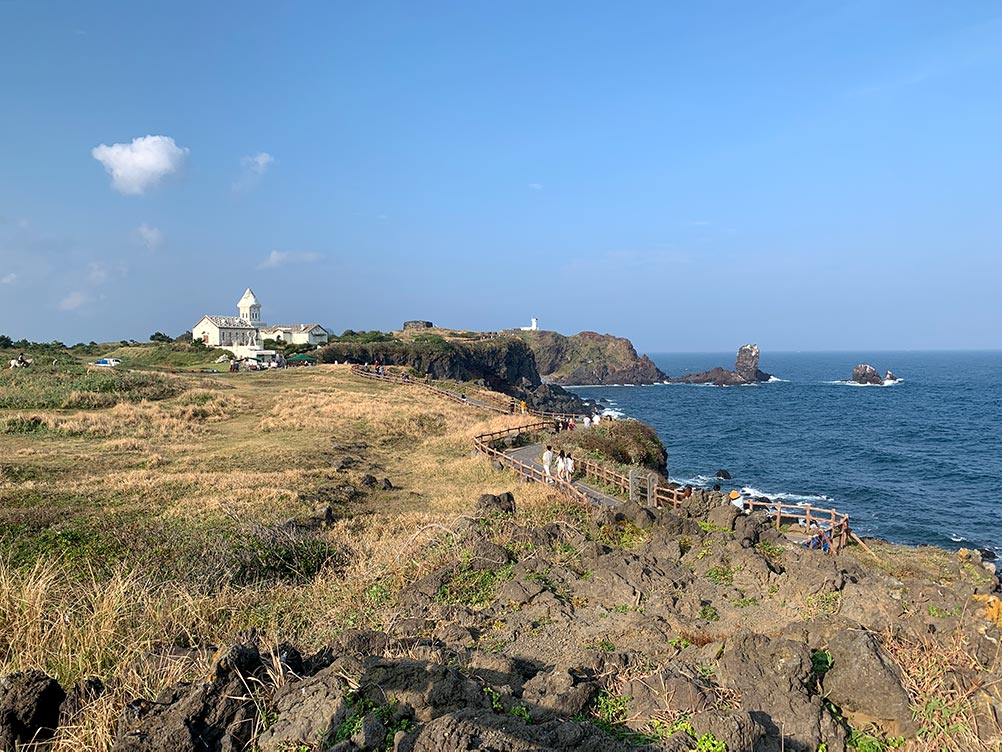
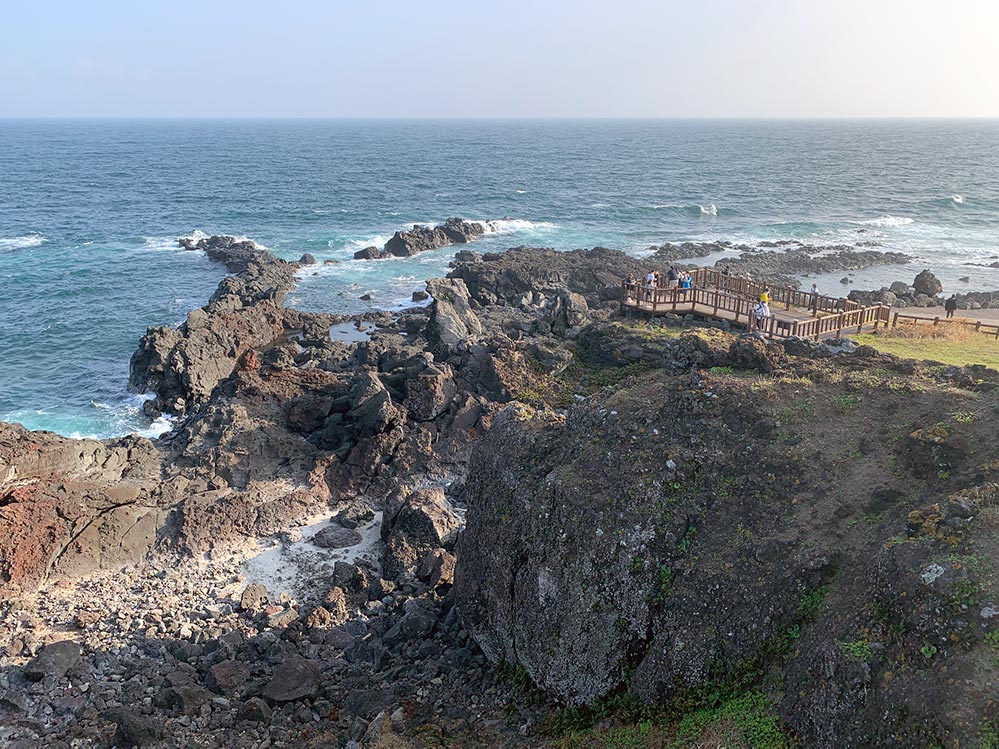
Snap shots at the All In House
This cute little house that looks a little like Hansel and Gretel come to life is also known as the All In House 올인하우스, named for a popular Korean drama in 2003 called All In about gambling featuring Lee Byung Hun and Song Hye Kyo.
You apparently used to be able to go in for a fee but it seems to be permanently closed nowadays. The sweet theme is also something new – it looked more like a normal chapel but after storm damage it was rebuilt with this sweet look.
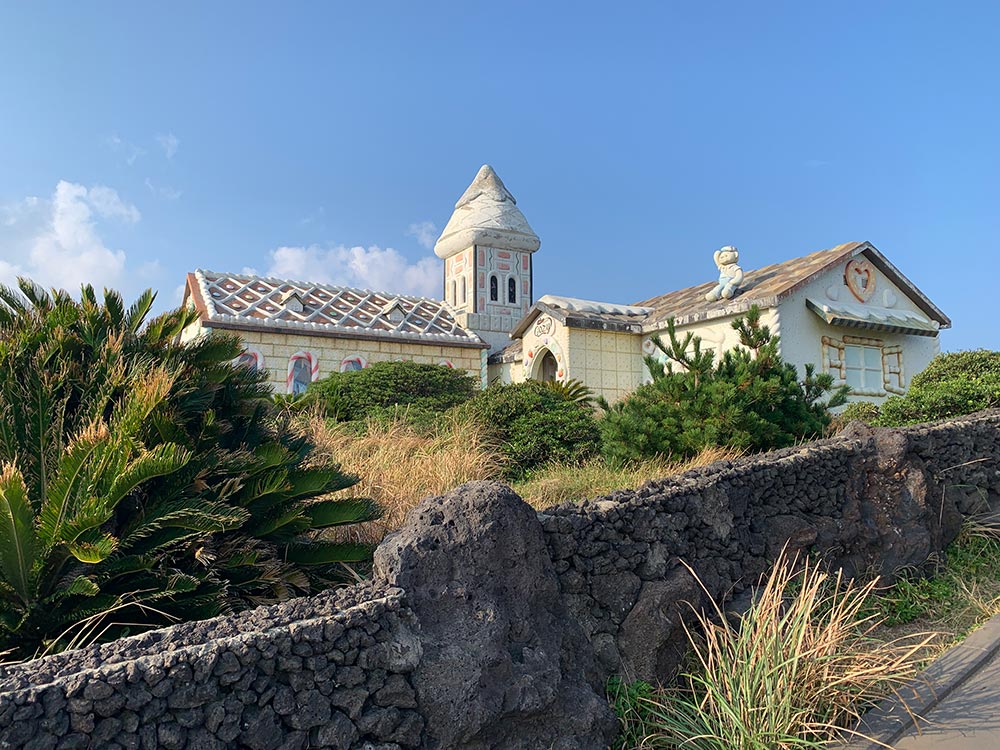
Climb up to Bangdupo Lighthouse
Brave some stairs to climb up to Bangdupo Lighthouse 방두포등대 where there are more lovely sea views to take in.
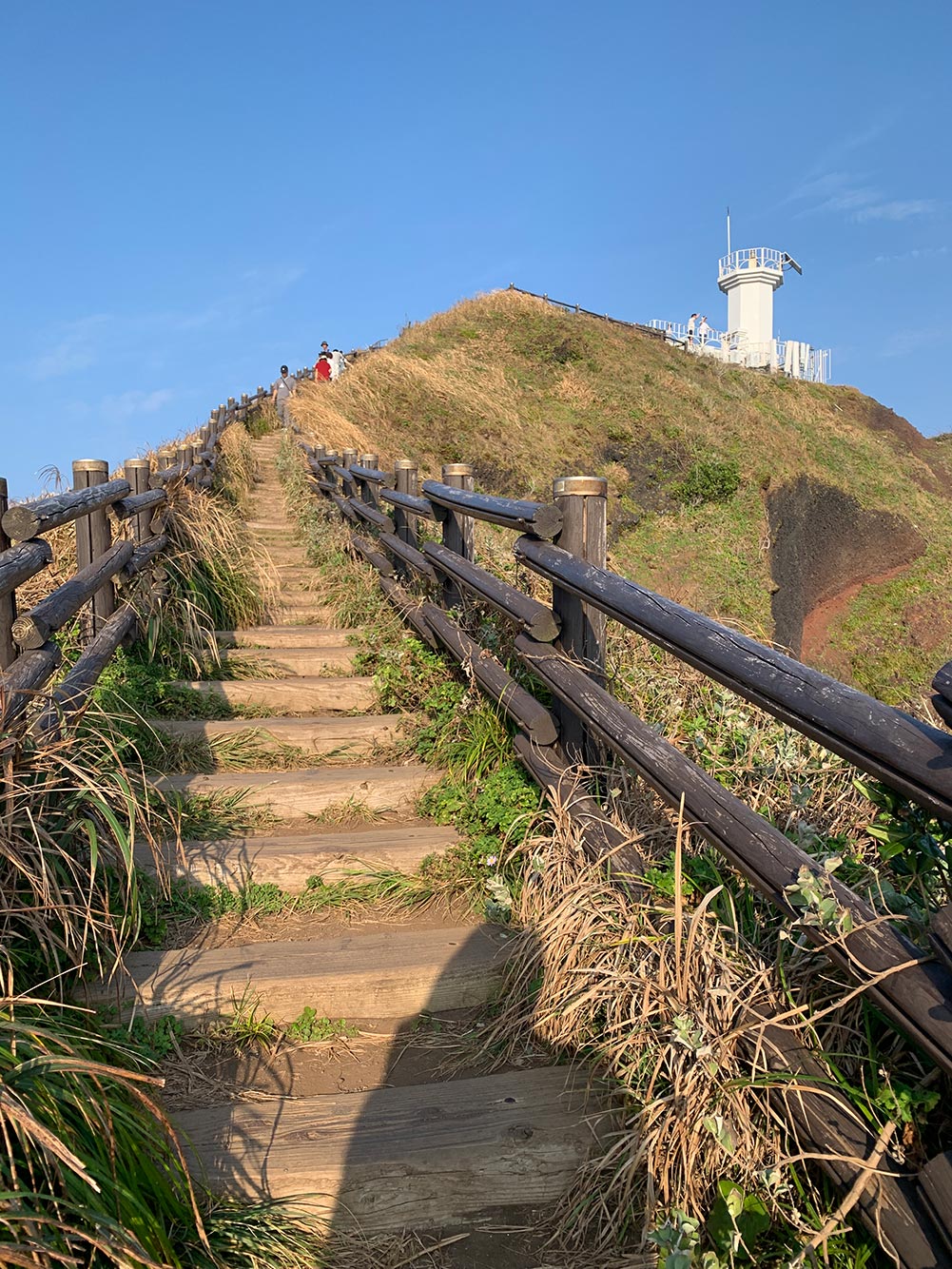
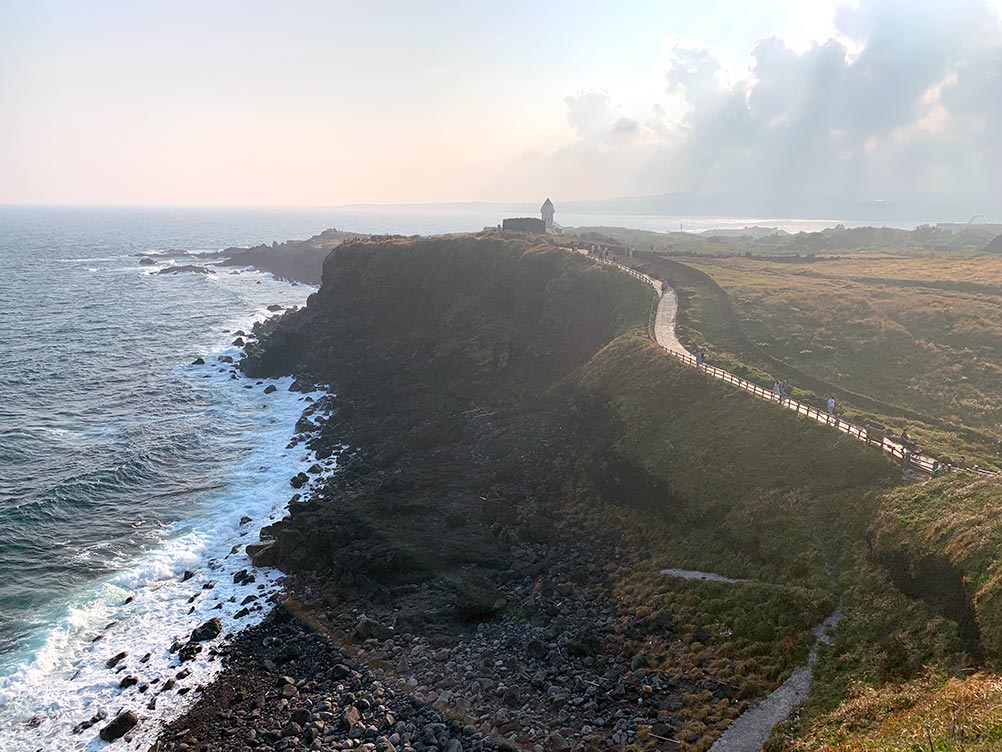
I could have walked towards Jeju Glass House but I was pretty tired so I decided to call it a day and head back to the bus stop. After this section, it was more coastal views – Seongsan Ilchulbong pops up again and Aqua Planet is on the left.
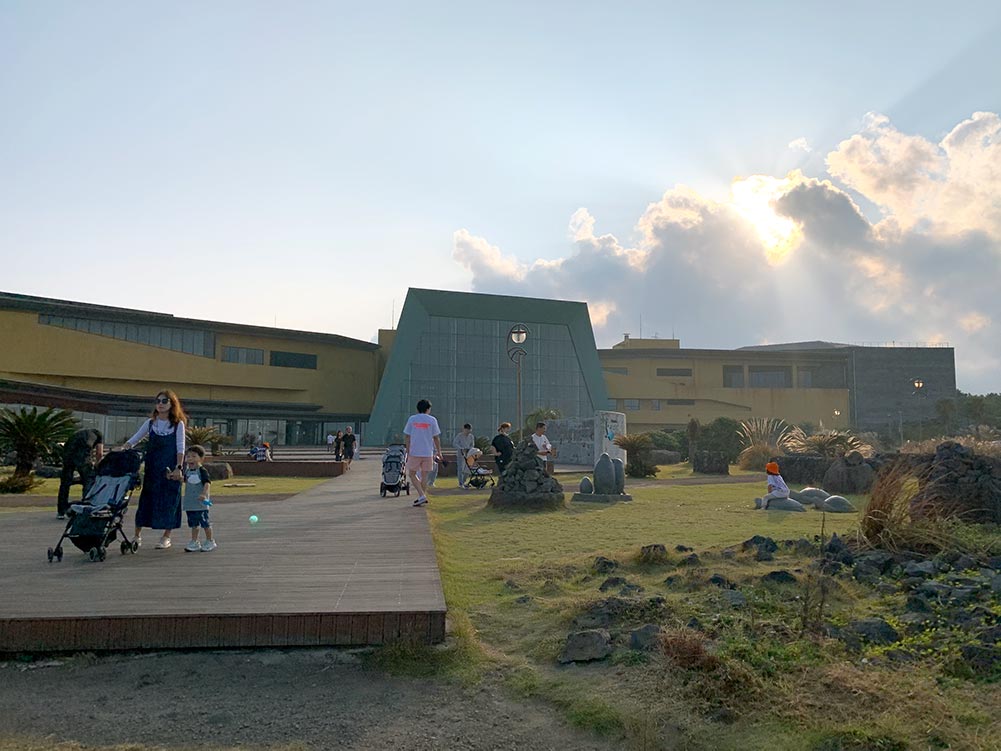
How to get to Seopjikoji
I got around Jeju by public transport. From Seongsan Ilchulbong, I took Blue Bus 295 down to Seopjikoji Beach [naver maps].
To get from Seopjikoji Beach back to Seogwipo where I was staying, I needed to take the 295 bus out to the main road [naver maps], but there was a very long interval for the bus so I decided to catch a cab from Seopjikoji Beach out to the main highway for 3,400 KRW instead. I opted to take Blue Bus 201 back to Seogwipo instead of the cab because it was evening rush hour and I knew I was going to run into traffic jams. Taking the bus cost just 1,200 KRW vs roughly 40,000 KRW if I was in a taxi, and the estimated travel time was just 10 minutes longer in the bus.
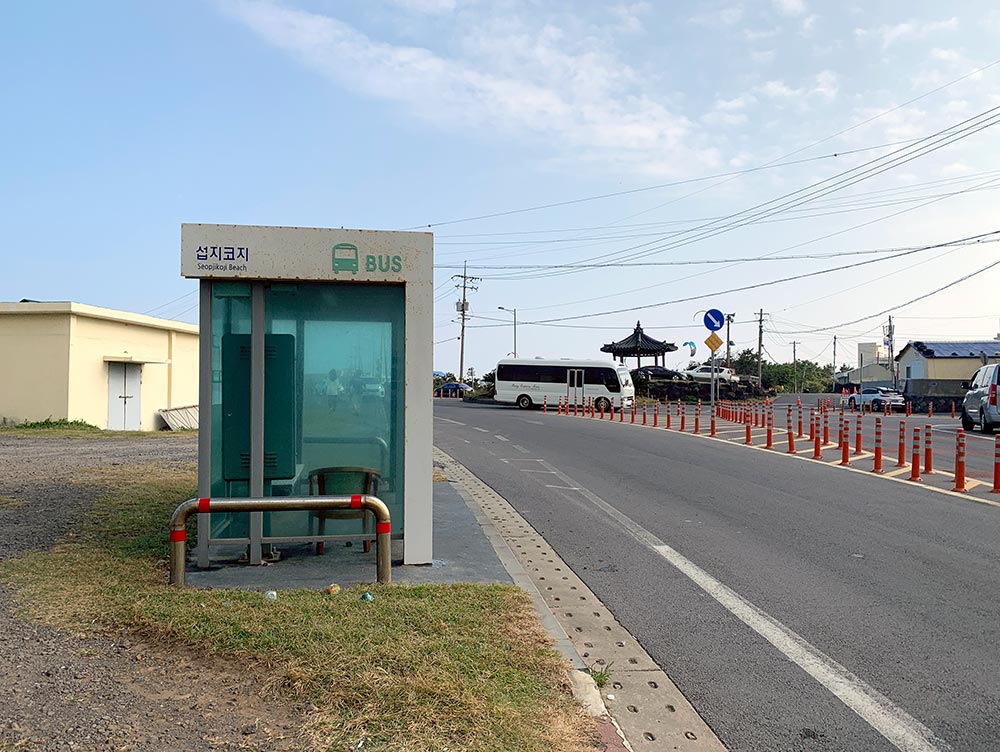
If you’re looking for more of my Jeju posts, check out Udo Island which is just off the shore from Seongsan Ilchulbong, or see my other guides to Aewol and Hallim in northwest Jeju, or Seogwipo and southwest Jeju.
Have you been to Seongsan Ilchulbong or Seopjikoji? Share your experience in the comments or check out the other Jeju posts that I have here.



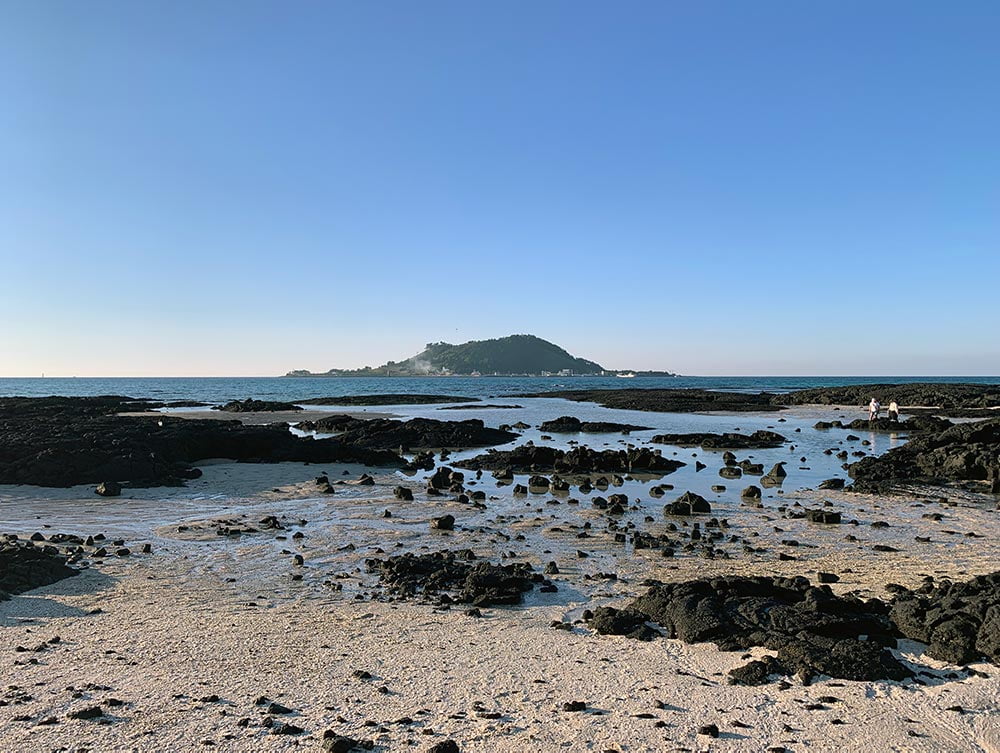
Cindy
Tuesday 22nd of July 2025
Hi, First of all, thanks for the amazing description of the place. It is so informative, I will be visiting Jeju very soon (in Aug). I am contemplating if I should do Udo-Seongsan ilchubong, or Seongsan ilchubong - Seopjikoji -and maybe chill in the afternoon in Seogwipo or woljeongri beach (since I will be staying in jeju city, because I can't drive there). Do you have any personal opinion regarding this? Thanks
Jaclynn Seah
Tuesday 22nd of July 2025
Hm that's a tough choice! You might have more flexibility with the Seongsan-Seopjikoji-Seogwipo itinerary, but if the weather is good then you might want to take advantage of the calmer seas and head to Udo. Hope that helps a little!